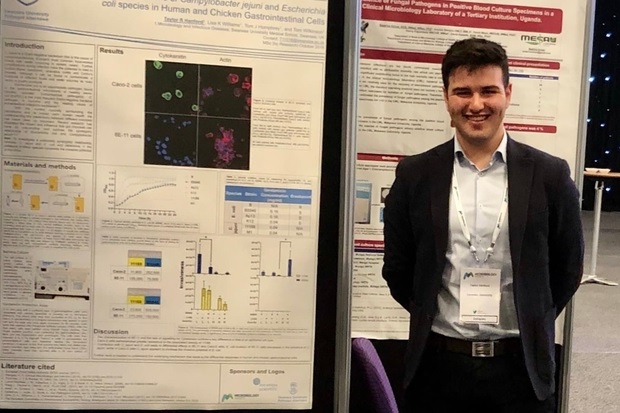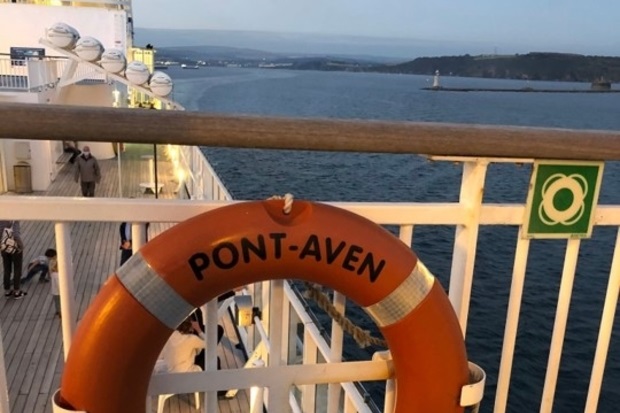
APHA participates in science programmes to benefit UK science, which enables young scientists to develop their scientific expertise and careers, with a One Health agenda, at our world-renowned laboratory facilities in Surrey and sometimes with our partners abroad. Hear about the experiences of one such scientist, Taylor Hanford, as he embarked on a PhD project taking him from our headquarters in Surrey to Brittany, France.
I am currently working on a PhD project investigating the development of antimicrobial resistance in bacteria that reside in chickens in a laboratory in France, an ambition I never expected to achieve, although my primary school teacher predicted that I would work with animals in one way or another. Throughout my teens, I kept my passion for animals alive and, in 2016, I graduated from Swansea University with a BSc in Biology. However, once my degree had finished, I was unsure of a career path and found a job at a factory in my hometown.
While I generally carried out chemistry-based quality control testing on disinfectant products, due to my biology degree I was often asked to help the microbiology team when there were staff shortages or large quantities of work. I quickly realised that I really enjoyed this work, which involved tasks such as culturing and identifying bacteria and measuring the effectiveness of products. It was through this work that I recognised that I wanted to do a PhD and specialise in microbiology.
I decided to return to Swansea University and used savings from my two years of work to fund an MSc by Research. I felt that this would make me a competitive candidate for a PhD project at the same time as making sure that this was the path I wanted to take in my life.
I had an amazing experience during my master’s degree. The microbial and infectious disease team at Swansea University were fantastic and I had amazing supervision. I was even lucky enough to give a poster presentation at the 2019 Federation of Infection Societies conference in Edinburgh, which just so happens to be my favourite city.
Decision to do a PhD
When researching PhDs online, I came across the UDoFRiC project, which is the acronym for: Understanding the Development of Fluoroquinolone (FQ) Resistance in Campylobacter present in broilers and the risks of FQ resistance persisting through the food-chain to cause disease in people.
The long title did not put me off because the project focussed on an important one health issue that interested me and seemed like a fantastic opportunity to work with the influential partners involved.
The project is one of many that APHA is involved in as part of the One Health European Joint Programme (OH EJP). My PhD funding was awarded to the University of Warwick and my workplace is shared between APHA in Surrey and The French Agency for Food, Environmental and Occupational Health & Safety (ANSES) in France.
Working at APHA
The start of my PhD felt like a whirlwind, the project is just three years long, so we had to make use of any available time. In the first couple of weeks I started planning my work with John Rodgers, my project lead at APHA … and then the pandemic hit! Prime Minister, Boris Johnson announced a national lockdown, and that people must work from home if they can. So, I packed a bag with two weeks’ worth of clothes and went back to my family home in Wales. That lasted for six months.
At first, we were unsure of what to do. Like everyone, I had a crash course in Zoom meetings and when it became clear that this was not a two-week lockdown, we drew up a revised plan for me to remotely analyse research and surveillance data on Campylobacter in poultry that APHA had collected over the past two decades, and to focus on laboratory-based activity when the COVID-19 restrictions relaxed.
When I did return to APHA, I spent a lot of time catching up in the lab but at least I was well prepared. However, I did spend the first three weeks typing out a hand-written file of data from 1995!
My supervisors at APHA have helped me immensely in my development as a scientist. Early on, my scientific writing skills were improved by thorough and detailed feedback. This has been particularly important to me as English has never been my strong suit as I often write as I speak.
In more practical science, I have also had great experience in optimising experiments - from the early days of my PhD, trying to extract the DNA of Campylobacter, to the week I left, trying to figure out if I could use PCR to predict fluoroquinolone resistance.
I have been trained in the importance of planning and visualising my experiments ahead of time, making sure I have enough consumable equipment (like agar plates), ensuring equipment is functioning properly and liaising with others to make sure there are not any clashes with lab space or equipment. The team I worked with at APHA have also been phenomenal at helping me learn bioinformatics, especially over lockdown when they had to teach everything to me through sharing their computer screens over Microsoft Teams.
I found working in such a well-equipped, world-renowned organisation to be invaluable both in terms of my studies and science career. I feel fortunate to have been given the opportunity to work alongside experts in their field who could not have been more helpful during my time at APHA. I would thoroughly recommend APHA as both a great place to work and a supportive environment to study.
My move to France

Fresh from the boat, I met my new colleagues. There was just one issue… I do not speak French very well! I had been learning French online for a few years, so I knew some basics, but I was woefully unprepared for life in an area where most people do not speak English. I just settled for “Bonjour, ça va?” (in a strong Welsh accent) and smiled and nodded at responses given, completely not understanding what was being said. Thankfully, I do like to think I have made some progress since being here!
The scientific team at ANSES are amazing, they are all extremely helpful (despite the language barrier), and I am eternally grateful to my supervisor, Isabelle, for translating anything important when it comes to my experiments. The work here is also very rewarding. I really enjoy designing experiments, getting exciting results and interpreting the outcome of the data.
I am also still in regular contact with all my supervisors at APHA. Be that sending drafts for editing (sorry for the state of them), frantically calling in a panic when I get some unusual looking genetic sequence data and sending last-minute copies of presentations/abstracts to review.
My academic supervisor at the University of Warwick has also been outstanding, guiding me through all sorts of paperwork that the university requires. He also offers a great perspective on any work I send him thanks to his academic background.
I am very grateful for the opportunity presented to me by APHA, ANSES, OH EJP and the University of Warwick. When I graduated, I never thought that I would be offered such an amazing project that also allowed me to develop and grow my scientific expertise and experience life abroad. As have just entered the final year of my PhD, I am aware that the learning curve is still steep, but I feel that the experience so far has already helped me develop into a much stronger scientist.

Recent Comments